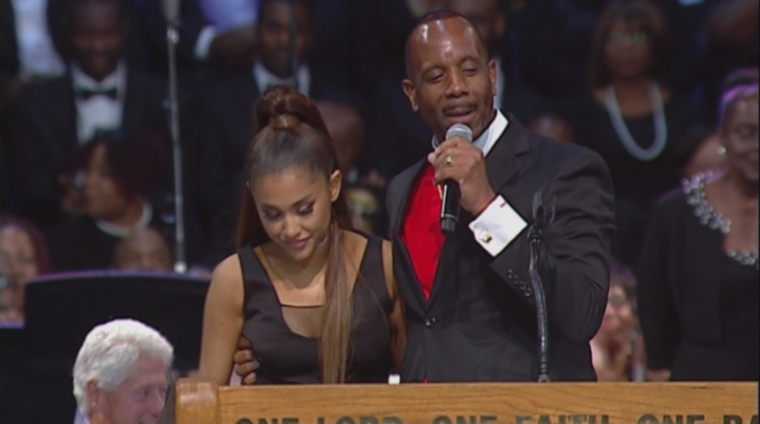When is an apology not an apology? What Bishop Charles Ellis should have said to Ariana Grande
Elton John said it as well as anyone can when he wrote the timeless lyric, 'Sorry seems to be the hardest word.' However, 'sorry' sometimes seems to be the easiest word, particularly when we don't really mean it.
Last Friday the life of Aretha Franklin, the Queen of Soul, was celebrated in the most extraordinary way. It was a funeral that will go down in history and for the most part would have done Aretha proud. However, during the 10-hour event there were some jarring incidents, which resulted in an apology that really was a non-apology.

Bishop Charles H Ellis III, when introducing Ariana Grande, attempted to make a joke about her name. When Ms Grande joined him on stage, he then proceeded to put his arm around her in an inappropriate and extremely awkward hold.
The ensuing outraged social media storm resulted in Bishop Ellis issuing an apology: 'It would never be my intention to touch any woman's breast. I was, I don't know I guess I put my arm around her. Maybe I crossed the border, maybe I was too friendly or familiar but again, I apologise.'
I'm sorry (see what I did there, Bishop Ellis) but this isn't an apology.
He continued: 'If somebody took it the wrong way, or if they were offended by it, the easiest thing and the right thing for me to do, as a Christian, as a man of God is to apologise, and I sincerely apologise to Ariana again if I offended her in any kind of way.'
There are no ifs or maybes in apologies. When you apologise, you are saying sorry for an offence you have caused
The bishop also expressed regret about the joke he made when he saw Ms Grande's name on the programme. 'I certainly want to apologise to Ariana and to her fans and to her family and to her entire community if what I said was taken the wrong way. Listen, maybe it's just a joke that went bad...Listen, it's not about whether I meant it or didn't mean it, or whether somebody took it the wrong way, I'm the one that said it and if it was taken to be an offensive statement, I apologise. That's the easiest thing for me to do, the right thing for me to do and I certainly hope that she will forgive me.'
I too hope Ms Grande will forgive you, Bishop Ellis, because forgiveness is a spiritual principle which breaks down strongholds. Forgiveness helps to bring healing and liberation. However, if she does, it will not be because she accepted your apology, because there wasn't an apology.
An apology claims ownership of the offence, humiliation and hurt caused. The bishop's apology made no admission that he actually did or said anything offensive. What in fact was implied was that the recipient of the offence didn't understand what was intended and in fact the recipient was in the wrong for incorrectly interpreting what was meant. Bishop Ellis' non-apology was a way for him to salve his conscience and move past what had happened without taking any responsibility.
I have no doubt that Bishop Ellis is a man of God who has done much good in his life, but in this case he got it wrong. One of the things that saddens me about this whole sorry incident, is that the opportunity for a known personality and a Christian to publicly apologise well, was lost.
This was an opportunity for a Christ follower to show humility. It was an opportunity for the Christian community to put right a hurt. He botched it.
There is something extremely powerful in a genuine heartfelt apology. Saying sorry, and meaning it, is a powerful tool which can go some way in helping to repair the damage caused. It can also help the parties involved move towards resolution and forgiveness. An earnest, open and honest apology doesn't make the offence right, but it can bring healing.
Here is what Bishop Ellis ought to have said.
'Ariana, from the bottom of my heart I am so sorry for causing you distress. I acted inappropriately and was very wrong to put my arm around you and touch your breast. I crossed the border. I am deeply sorry I disrespected you. The right thing for me to do as a Christian, as a man of God is to apologise, and I sincerely apologise to you for any suffering I have caused you.
'I certainly want to apologise to Ariana and to her fans and to her family and to her entire community. It's not about whether I meant it or didn't mean it, or whether somebody took it the wrong way, I'm the one that said it and I sincerely apologise for the offensiveness of my statement and for the hurt and humiliation I have caused.'
Life is hard enough. Let's not make it more difficult for each other. As followers of Jesus we need to do better – we need to be the carriers of love, grace, kindness, forgiveness, mercy and justice. We need to be the ones who apologise well and be the first to show authentic repentance and Godly tear-filled sorrow when we get it wrong.
Many of us Jesus followers want to and will continue to work on showing, as Aretha herself sang so powerfully, R.E.S.P.E.C.T. to all humanity.
Mandy Bayton is The Cinnamon Network Advisor for Wales and a freelance writer. Follow her on Twitter @mandyebayton











